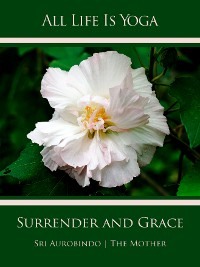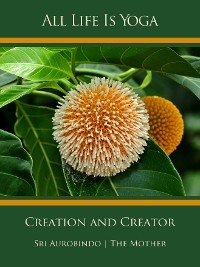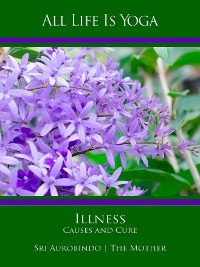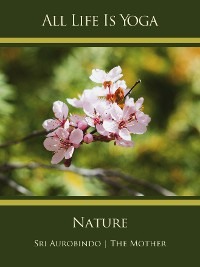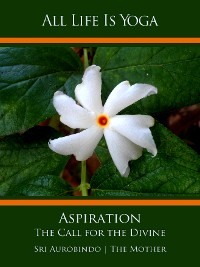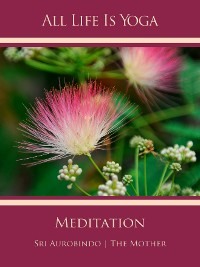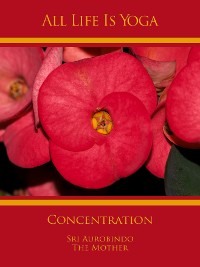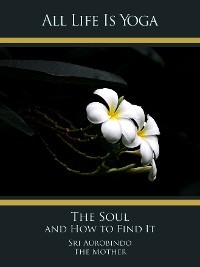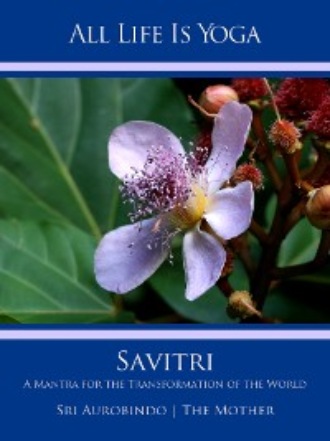
Полная версия
All Life Is Yoga: Savitri
*
Words of Sri Aurobindo
I have not anywhere in Savitri written anything for the sake of mere picturesqueness or merely to produce a rhetorical effect; what I am trying to do everywhere in the poem is to express exactly something seen, something felt or experienced; if, for instance, I indulge in the wealth-burdened line or passage, it is not merely for the pleasure of the indulgence, but because there is that burden, or at least what I conceive to be that, in the vision or the experience. When the expression has been found, I have to judge, not by the intellect or by any set poetical rule, but by an intuitive feeling, whether it is entirely the right expression and, if it is not, I have to change and go on changing until I have received the absolutely right inspiration and the right transcription of it and must never be satisfied with any à peu près or imperfect transcription even if that makes good poetry of one kind or another. This is what I have tried to do. The critic or reader will judge for himself whether I have succeeded or failed; but if he has seen nothing and understood nothing, it does not follow that his adverse judgment is sure to be the right and true one, there is at least a chance that he may so conclude, not because there is nothing to see and nothing to understand, only poor pseudo-stuff or a rhetorical emptiness but because he was not equipped for the vision or the understanding. Savitri is the record of a seeing, of an experience which is not of the common kind and is often very far from what the general human mind sees and experiences. You must not expect appreciation or understanding from the general public or even from many at the first touch; as I have pointed out, there must be a new extension of consciousness and aesthesis to appreciate a new kind of mystic poetry.
*
Words of Sri Aurobindo
This is not the method of Savitri. Its expression aims at a certain force, directness and spiritual clarity and reality. When it is not understood, it is because the truths it expresses are unfamiliar to the ordinary mind or belong to an untrodden domain or domains or enter into a field of occult experience; it is not because there is any attempt at a dark or vague profundity or at an escape from thought. The thinking is not intellectual but intuitive or more than intuitive, always expressing a vision, a spiritual contact or a knowledge which has come by entering into the thing itself, by identity.
* * *
Part II
A VISION OF HIGHER REALMS THAN OURS
Sri Aurobindo incarnated in a human body the supramental consciousness and has not only revealed to us the nature of the path to follow and the method of following it so as to arrive at the goal, but has also by his own personal realisation given us the example; he has provided us with the proof that the thing can be done and the time is now to do it. — The Mother
Chapter 1
The Supramental Vision and Its Expression
The Nature of the Supermind
Words of Sri Aurobindo
We have to regard therefore this all-containing, all-originating, all-consummating Supermind as the nature of the Divine Being, not indeed in its absolute self-existence, but in its action as the Lord and Creator of its own worlds. This is the truth of that which we call God.
*
Words of Sri Aurobindo
The Supermind is in its very essence a truth-consciousness, a consciousness always free from the Ignorance which is the foundation of our present natural or evolutionary existence and from which nature in us is trying to arrive at self-knowledge and world-knowledge and a right consciousness and the right use of our existence in the universe. The Supermind, because it is a truth-consciousness, has this knowledge inherent in it and this power of true existence; its course is straight and can go direct to its aim, its field is wide and can even be made illimitable. This is because its very nature is knowledge: it has not to acquire knowledge but possesses it in its own right; its steps are not from nescience or ignorance into some imperfect light, but from truth to greater truth, from right perception to deeper perception, from intuition to intuition, from illumination to utter and boundless luminousness, from growing widenesses to the utter vasts and to very infinitude. On its summits it possesses the divine omniscience and omnipotence, but even in an evolutionary movement of its own graded self-manifestation by which it would eventually reveal its own highest heights, it must be in its very nature essentially free from ignorance and error: it starts from truth and light and moves always in truth and light. As its knowledge is always true, so too its will is always true; it does not fumble in its handling of things or stumble in its paces. In the Supermind feeling and emotion do not depart from their truth, make no slips or mistakes, do not swerve from the right and the real, cannot misuse beauty and delight or twist away from a divine rectitude. In the Supermind sense cannot mislead or deviate into the grossnesses which are here its natural imperfections and the cause of reproach, distrust and misuse by our ignorance. Even an incomplete statement made by the Supermind is a truth leading to a further truth, its incomplete action a step towards completeness. All the life and action and leading of the Supermind is guarded in its very nature from the falsehoods and uncertainties that are our lot; it moves in safety towards its perfection. Once the truth-consciousness was established here on its own sure foundation, the evolution of divine life would be a progress in felicity, a march through light to Ananda.
*
The Supramental Vision
Words of Sri Aurobindo
He gazed across the empty stillnesses
And heard the footsteps of the undreamed Idea
In the far avenues of the Beyond.
He heard the secret Voice, the Word that knows,
And saw the secret face that is our own.
The inner planes uncovered their crystal doors;
Strange powers and influences touched his life.
A vision came of higher realms than ours,
A consciousness of brighter fields and skies,
Of beings less circumscribed than brief-lived men
And subtler bodies than these passing frames,
Objects too fine for our material grasp,
Acts vibrant with a superhuman light
And movements pushed by a superconscient force,
And joys that never flowed through mortal limbs,
And lovelier scenes than earth’s and happier lives.
A consciousness of beauty and of bliss,
A knowledge which became what it perceived,
Replaced the separated sense and heart
And drew all Nature into its embrace.
*
Words of the Mother
In the supramental vision one has a direct and total and immediate knowledge of things, in the sense that one sees everything at the same time, complete in itself, total. The truth of a thing in all its aspects at the same time and... simultaneous, complete. And as soon as one wants to explain that or to describe it, one is obliged to come down, so to say, to a plane which he calls here “the Mind of Light”, where things have to be said or even thought or expressed one after another, in a certain order and a certain relation with one another; the simultaneity disappears, for in the present state of our mode of expression, to say everything at the same time, all at once, is impossible, and we are compelled to veil one part of what we see or know in order to bring it out one thing after another; and this is what he calls the “veil”, which is transparent, for one sees everything, knows everything at the same time; one has the total knowledge of a thing, but one cannot express it fully all at once. There are no words or any possibility of expression, so long as we are what we are. We must necessarily make use of an inferior process to express ourselves, and yet, at the same time we have the full knowledge; it is only the necessity of transmitting his knowledge in words which compels us to veil, so to say, a part of what we know and to let it come out only successively. But it is a transparent veil, for we know the thing – we know it, see it, understand it in its totality – but we cannot express it all at the same time. We have to say it, one thing after another, successively. It is the veil of the expression adapted to our needs both of utterance and understanding. The knowledge is there, it is there in reality – not that one is searching for it and expressing it as one goes on finding it – it is there in its totality but the expression demands that one says it one thing after another; and so this naturally diminishes the omnipotence of which he speaks, for omnipotence is the total vision of the thing expressed in its totality. Omniscience is there in principle, it is there, perceptible, but the total power of this omniscience cannot act since it needs to come down one plane to be able to express itself.
To be able to live fully in the supramental knowledge requires other means of expression than the ones we have now. New means of expression must be worked out to make it possible to express the supramental knowledge in a supramental way.... Now, we are obliged to raise our mental capacity to its utmost so that there is only, so to say, a sort of hardly perceptible borderline, but one that still exists, for all our means of expression still belong to this mental world, do not have the supramental capacity. We do not have the necessary organs for that. We would have to become beings of the supermind, with a supramental substance, a supramental inner organisation, in order to be able to express the supramental knowledge in a supramental way. So far we are... half way; we can, somewhere in our consciousness, rise entirely into the supramental vision and knowledge, but we cannot express it. We have to come down again one plane in order to express ourselves.
* * *
Part III
THE CREATIVE WORD
The function of a mantra is to create vibrations in the inner consciousness that will prepare it for the realisation of what the mantra symbolises and is supposed indeed to carry within itself. — Sri Aurobindo
Chapter 1
Theory of the Mantra
The Supreme Word
Words of Sri Aurobindo
...We must recollect that in the Vedic system the Word was the creatrix; by the Word Brahma creates the forms of the universe. Moreover, human speech at its highest merely attempts to recover by revelation and inspiration an absolute expression of Truth which already exists in the Infinite above our mental comprehension. Equally, then, must that Word be above our power of mental construction.
All creation is expression by the Word; but the form which is expressed is only a symbol or representation of the thing which is. We see this in human speech which only presents to the mind a mental form of the object; but the object it seeks to express is itself only a form or presentation of another Reality. That reality is Brahman. Brahman expresses by the Word a form or presentation of himself in the objects of sense and consciousness which constitute the universe, just as the human word expresses a mental image of those objects. That Word is creative in a deeper and more original sense than human speech and with a power of which the utmost creativeness of human speech can be only a far-off and feeble analogy.
The word used here for utterance means literally a raising up to confront the mind. Brahman, says the Upanishad, is that which cannot be so raised up before the mind by speech.
Human speech, as we see, raises up only the presentation of a presentation, the mental figure of an object which is itself only a figure of the sole Reality, Brahman. It has indeed a power of new creation, but even that power only extends to the creation of new mental images, that is to say of adaptive formations based upon previous mental images. Such a limited power gives no idea of the original creative puissance which the old thinkers attributed to the divine Word.
If, however, we go a little deeper below the surface, we shall arrive at a power in human speech which does give us a remote image of the original creative Word. We know that vibration of sound has the power to create – and to destroy – forms; this is a commonplace of modern Science. Let us suppose that behind all forms there has been a creative vibration of sound.
Next, let us examine the relation of human speech to sound in general. We see at once that speech is only a particular application of the principle of sound, a vibration made by pressure of the breath in its passage through the throat and mouth. At first, beyond doubt, it must have been formed naturally and spontaneously to express the sensations and emotions created by an object or occurrence and only afterwards seized upon by the mind to express first the idea of the object and then ideas about the object. The value of speech would therefore seem to be only representative and not creative.
But, in fact, speech is creative. It creates forms of emotion, mental images and impulses of action. The ancient Vedic theory and practice extended this creative action of speech by the use of the Mantra. The theory of the Mantra is that it is a word of power born out of the secret depths of our being where it has been brooded upon by a deeper consciousness than the mental, framed in the heart and not originally constructed by the intellect, held in the mind, again concentrated on by the waking mental consciousness and then thrown out silently or vocally – the silent word is perhaps held to be more potent than the spoken – precisely for the work of creation. The Mantra can not only create new subjective states in ourselves, alter our psychical being, reveal knowledge and faculties we did not before possess, can not only produce similar results in other minds than that of the user, but can produce vibrations in the mental and vital atmosphere which result in effects, in actions and even in the production of material forms on the physical plane.
As a matter of fact, even ordinarily, even daily and hourly we do produce by the word within us thought-vibrations, thought-forms which result in corresponding vital and physical vibrations, act upon ourselves, act upon others, and end in the indirect creation of actions and of forms in the physical world. Man is constantly acting upon man both by the silent and the spoken word and he so acts and creates though less directly and powerfully even in the rest of Nature. But because we are stupidly engrossed with the external forms and phenomena of the world and do not trouble to examine its subtle and non-physical processes, we remain ignorant of all this field of science behind.
The Vedic use of the Mantra is only a conscious utilisation of this secret power of the word. And if we take the theory that underlies it together with our previous hypothesis of a creative vibration of sound behind every formation, we shall begin to understand the idea of the original creative Word. Let us suppose a conscious use of the vibrations of sound which will produce corresponding forms or changes of form. But Matter is only, in the ancient view, the lowest of the planes of existence. Let us realise then that a vibration of sound on the material plane presupposes a corresponding vibration on the vital without which it could not have come into play; that again presupposes a corresponding originative vibration on the mental; the mental presupposes a corresponding originative vibration on the supramental at the very root of things. But a mental vibration implies thought and perception and a supramental vibration implies a supreme vision and discernment. All vibration of sound on that higher plane is, then, instinct with and expressive of this supreme discernment of a truth in things and is at the same time creative, instinct with a supreme power which casts into forms the truth discerned and eventually, descending from plane to plane, reproduces it in the physical form or object created in Matter by etheric sound. Thus we see that the theory of creation by the Word which is the absolute expression of the Truth, and the theory of the material creation by sound-vibration in the ether correspond and are two logical poles of the same idea. They both belong to the same ancient Vedic system.
This, then, is the supreme Word, Speech of our speech. It is vibration of pure Existence, instinct with the perceptive and originative power of infinite and omnipotent consciousness, shaped by the Mind behind mind into the inevitable word of the Truth of things; out of whatever substance on whatever plane, the form or physical expression emerges by its creative agency. The Supermind using the Word is the creative Logos.
The Word has its seed-sounds – suggesting the eternal syllable of the Veda, AUM, and the seed-sounds of the Tantriks – which carry in them the principles of things; it has its forms which stand behind the revelatory and inspired speech that comes to man’s supreme faculties, and these compel the forms of things in the universe; it has its rhythms, – for it is no disordered vibration, but moves out into great cosmic measures, – and according to the rhythm is the law, arrangement, harmony, processes of the world it builds. Life itself is a rhythm of God.
But what is it that is expressed or raised up before the mental consciousness by the Word in the phenomenal world? Not Brahman, but truths, forms and phenomena of Brahman. Brahman is not, cannot be expressed by the Word; he does not use the word here to express his very self, but is known only to his own self-awareness. And even the truths of himself that stand behind the forms of cosmic things are in their true reality always self-expressed to his eternal vision in a higher than the mental vibration, a rhythm and voice of themselves that is their own very soul of movement. Speech, a lesser thing, creates, expresses, but is itself only a creation and expression. Brahman is not expressed by speech, but speech is itself expressed by Brahman. And that which expresses speech in us, brings it up out of our consciousness with its strivings to raise up the truth of things to our mind, is Brahman himself as the Word, a Thing that is in the supreme superconscience. That Word, Speech of our speech, is in its essence of Power the Eternal himself and in its supreme movements a part of his very form and everlasting spiritual body, brahmano rupam.
Therefore it is not the happenings and phenomena of the world that we have to accept finally as our object of pursuit, but That which brings out from itself the Word by which they were thrown into form for our observation by the consciousness and for our pursuit by the will. In other words, the supreme Existence that has originated all.
Human speech is only a secondary expression and at its highest a shadow of the divine Word, of the seed-sounds, the satisfying rhythms, the revealing forms of sound that are the omniscient and omnipotent speech of the eternal Thinker, Harmonist, Creator. The highest inspired speech to which the human mind can attain, the word most unanalysably expressive of supreme truth, the most puissant syllable or mantra can only be its far-off representation.
*
The Mantra – a word of power and light
Words of Sri Aurobindo
The mantra as I have tried to describe it in The Future Poetry is a word of power and light that comes from the Overmind inspiration or from some very high plane of Intuition. Its characteristics are a language that conveys infinitely more than the mere surface sense of the words seems to indicate, a rhythm that means even more than the language and is born out of the Infinite and disappears into it, and the power to convey not merely the mental, vital or physical contents or indications or values of the thing uttered, but its significance and figure in some fundamental and original consciousness which is behind all these and greater.
*
The three highest intensities of poetic speech
Words of Sri Aurobindo
The mantra, poetic expression of the deepest spiritual reality, is only possible when three highest intensities of poetic speech meet and become indissolubly one, a highest intensity of rhythmic movement, a highest intensity of interwoven verbal form and thought-substance, of style, and a highest intensity of the soul’s vision of truth. All great poetry comes about by a unison of these three elements; it is the insufficiency of one or another which makes the inequalities in the work of even the greatest poets, and it is the failure of some one element which is the cause of their lapses, of the scoriae in their work, the spots in the sun. But it is only at a certain highest level of the fused intensities that the Mantra becomes possible.
*
The Mantra – a divinely burdened rhythmic word
Words of Sri Aurobindo
The Mantra in other words is a direct and most heightened, an intensest and most divinely burdened rhythmic word which embodies an intuitive and revelatory inspiration and ensouls the mind with the sight and the presence of the very self, the inmost reality of things and with its truth and with the divine soul-forms of it, the Godheads which are born from the living Truth. Or, let us say, it is a supreme rhythmic language which seizes hold upon all that is finite and brings into each the light and voice of its own infinite.
*
The Mantra – the highest power of speech
Words of Sri Aurobindo
A supreme, an absolute of itself, a reaching to an infinite and utmost, a last point of perfection of its own possibilities is that to which all action of Nature intuitively tends in its unconscious formations and when it has arrived to that point it has justified its existence to the spirit which has created it and fulfilled the secret creative will within it. Speech, the expressive Word, has such a summit or absolute, a perfection which is the touch of the infinite upon its finite possibilities and the seal upon it of its Creator. This absolute of the expressive Word can be given the name which was found for it by the inspired singers of the Veda, the Mantra. Poetry especially claimed for its perfected expression in the hymns of the Veda this name. It is not confined however to this sense, for it is extended to all speech that has a supreme or an absolute power; the Mantra is the word that carries the godhead in it or the power of the godhead, can bring it into the consciousness and fix there it and its workings, awaken there the thrill of the infinite, the force of something absolute, perpetuate the miracle of the supreme utterance. This highest power of speech and especially of poetic speech is what we have to make here the object of our scrutiny, discover, if we can, its secret, regard the stream of poetry as a long course of the endeavour of human speech to find it and the greater generalisation of its presence and its power as the future sign of an ultimate climbing towards an ultimate evolution as a poetic consciousness towards the conquest of its ultimate summits.
*
The Mantra – a great formative and illuminative power
Words of Sri Aurobindo
For neither the intelligence, the imagination nor the ear are the true or at least the deepest or highest recipients of the poetic delight, even as they are not its true or highest creators; they are only its channels and instruments: the true creator, the true hearer is the soul. The more rapidly and transparently the rest do their work of transmission, the less they make of their separate claim to satisfaction, the more directly the word reaches and sinks deep into the soul, the greater the poetry. Therefore poetry has not really done its work, at least its highest work, until it has raised the pleasure of the instrument and transmuted it into the deeper delight of the soul. A divine Ananda,1 a delight interpretative, creative, revealing, formative, – one might almost say, an inverse reflection of the joy which the universal Soul felt in its great release of energy when it rang out into the rhythmic forms of the universe the spiritual truth, the large interpretative idea, the life, the power, the emotion of things packed into an original creative vision, – such spiritual joy is that which the soul of the poet feels and which, when he can conquer the human difficulties of his task, he succeeds in pouring also into all those who are prepared to receive it. This delight is not merely a godlike pastime; it is a great formative and illuminative power.




